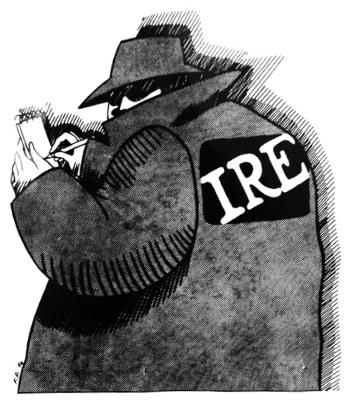If you fill out the "Forgot Password" form but don't get an email to reset your password within 5-10 minutes, please email logistics@ire.org for assistance.
As part of IRE's 50th anniversary and spring member drive, we’re sharing some of the biggest moments in investigative journalism since 1975.
(April 1, 2025) – Investigative journalism did not begin with Watergate, but it was a watershed moment for the field when a story about a D.C. burglary led to the resignation of a sitting president.
Len Downie Jr., an IRE founder and Watergate editor, saw the first story about the 1972 DNC headquarters break-in while he was in London for a fellowship. It didn’t scream “scandal” right away, but there was something strange unfolding. He recalled the series of events during the 2012 IRE Conference in Boston:
“I saw this odd story,” Downie said. “And I found the bylines on it odd.”
“Carl Bernstein, who had been at the paper for about as long as I had been, I was amazed he was still working there. ... And I had never heard of Bob Woodward because he had been hired while I was away on leave.”
When he returned to the newsroom, Downie played a major role in editing the Washington Post’s years-long coverage of Watergate.
Even though there was some questioning of authority during this time – especially after the Vietnam War and Pentagon Papers – Downie said political journalists were still shocked by Watergate. A conspiracy of this level seemed unfathomable.
“Within our own newsroom, there was skepticism,” Downie said. “… about what the paper was doing to itself by pursuing what looked like a silly, stupid story.”
For the next two years, they chased leads and reported on the burglary’s links to the White House and the Nixon reelection campaign, leaks from Deep Throat, the Senate Watergate hearings, the involvement of hush money and secret tapes, and the eventual resignation of President Nixon. See the timeline of events by The Washington Post.
Because of Watergate, investigative reporting became a key part of American journalism and culture.
The film depiction of Woodward and Bernstein’s book, “All the President’s Men,” emphasized the central tenets of investigative journalism: Knocking on doors. Finding documents. Following the money. Read more in Downie’s column for The Washington Post.
“The book itself is like a primer on basic reporting,” Bernstein told ABC News last year. “You see what's the most important decision we make as reporters? To go out at night and to visit people who work for Richard Nixon and his reelection in their homes, knock on their doors, have the doors you know, slammed in our faces, except for the few that didn't.”
It’s important to remember that raw perseverance of shoe-leather reporting. Woodward and Bernstein didn’t set out to oust a president; they were writing a story about a break-in that turned into so much more.
“It’s about fitting little pieces together,” Woodward told Roy J. Harris for the book Pulitzer’s Gold: A Century of Public Service Journalism. “You don’t know what you have when you publish a little piece, but you publish it anyway.”

Another impact of Watergate? More journalists and news organizations wanted to pursue investigations, but they didn't necessarily have the experience. That’s where IRE comes in.
In 1975, a group came together to form a national organization embodying the mission of investigative reporting, hoping to set standards and best practices in this growing field. They included Downie, Myrta Pulliam, Paul Williams, Les Whitten, among several others.
“It dawned on people that they don’t have to reinvent the wheel,” Pulliam told The IRE Journal in 2015. “They could help themselves and each other by sharing information and techniques."
In the interview with ABC News, Woodward and Bernstein also touched on the importance of working together.
“What it demonstrates is the power of collaboration,” Woodward said. “We learn in our personal lives you never do anything alone effectively. And it's the same with journalism.”
Read the very first Watergate story here.
Listen to a recording of the conference session referenced in this story: The legacy of Watergate: A conversation with Leonard Downie Jr. (2012).
This recording has been made publicly available from the IRE Resource Center, which is home to thousands of journalism tipsheets, stories, audio recordings and other resources to help enhance your reporting. The Resource Center is available for free to IRE members, and it's just one of our many member benefits!
Learn more and join IRE today.

Looks like you haven't made a choice yet.